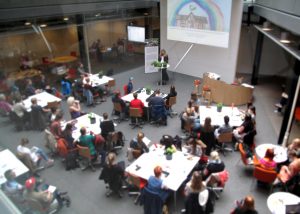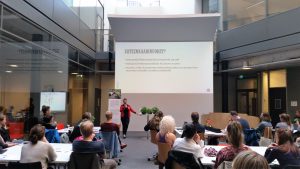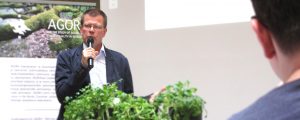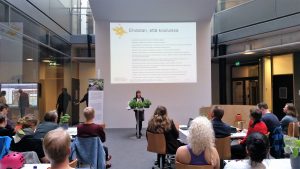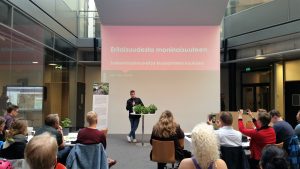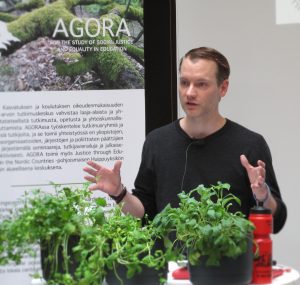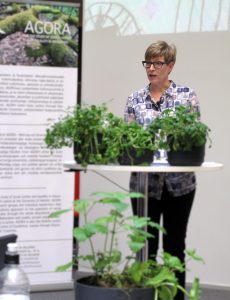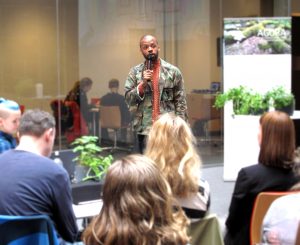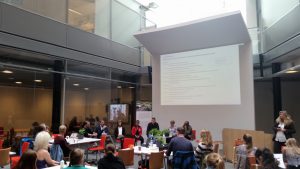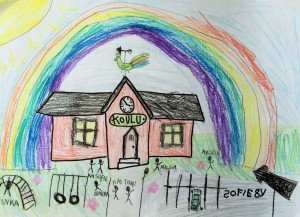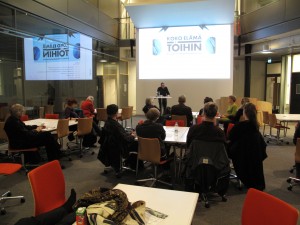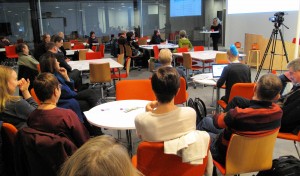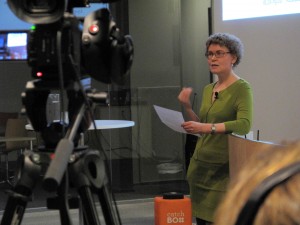Wednesday, March 9th on the first day of the 44th NERA congress professors Kristiina Brunila (University of Helsinki), Kathryn Ecclestone (University of Sheffield) and Lisbeth Lundahl (Umeå University) in association with the Nordic Centre of Excellence: Justice through Education in the Nordic Countries chaired a symposium titled “A global epidemic of mental ill-health? Interdisciplinary perspectives on the educational implications of reconfiguring social, economic and human crises”.
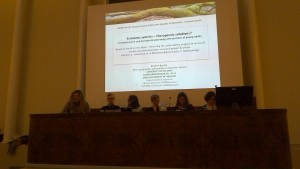
The collaborative Symposium brought together researchers who share an interest in trying to understand the social, political and educational roots and outcomes of an era of ‘multiple crises’. It responded to a phenomenon in growing numbers of countries around the world where policy makers, media pundits, researchers and citizens themselves depict apocryphal discourses of crisis. These range from parenting and education, to civic engagement, capitalism itself, the legitimacy of the state and its agencies, experts and authority. Amidst these crises, mental health, emotional well-being and vulnerability, have taken centre stage. Claims from the World Health Organisation that we face a global epidemic of mental ill-health intertwine with claims that we face unprecedented levels of civic disengagement, educational disaffection, poor parenting and economic recession. In many countries, educational settings have become key sites for rising levels of both targeted and generic psycho-emotional interventions.
Leaving aside the stark and pessimistic tones of crisis discourses, it does seem that there is a crisis of mental health amongst rising numbers of children, young people and adults. There has been a significant increase in diagnosis of syndromes, disorders and other psychological conditions and in prescribed drugs and compulsory specialist interventions, state-sponsored programmes in kindergarten/nurseries, schools, vocational, adult and higher education. But more widely, images of psycho-emotional vulnerability have led to a stark rise in the number of programmes to develop competences and attributes of emotional literacy, emotional management, resilience, empathy and self-esteem. And the language of trauma, abuse, stress, anxiety, depression and vulnerability is everywhere, from policy texts to everyday conversations at work and at home, to teachers’ discussions about their students.
Untangling and making sense of the nature and extent of a crisis of mental health is far from easy. It demands imaginative, interdisciplinary and open minded debate. Can we explain a preoccupation with mental health as a re-defining of everyday life and as part of what some sociologists and educationalists call ‘therapeutic culture’? Is it predominantly a social construction exploited and fuelled by global drug companies and the wider psychology industry? Or do governments unable to address intractable structural social and economic crisis benefit by attributing crisis to individuals’ weak psychological resilience? Is it that governments are trying to toughen us up psychologically to meet the demands of a highly competitive, neo-liberal, marketised world? What images of human subjects are implicated in these discourses and questions? More practically, what role does formal and informal education, at all levels, have in addressing these questions and in developing resilience?
Governing vulnerable, irrational, neurotic citizens in a world without a subject
Kathryn Ecclestone, Professor of Education, University of Sheffield, UK
‘Relentless problematisations’ (Isin 2004) of multiple crises create a spectrum from war, endemic poverty and violence to myriad diffused and vague meanings of vulnerability, risk and harm in everyday life and relationships. In family life, the whole education system, and workplaces, mental illness has become a particular target for a state-sponsored market of ‘early intervention’, ‘inoculation’ and ‘prevention’. In her presentation Ecclestone argued that a focus on attempts by the market and the state to make people psychologically responsible for structural crisis overlooks a wider crisis of subjectivity. Taking higher education as a focus, she explored how the mentally, emotionally, psychologically vulnerable, irrational and neurotic subject permeates formal systems and processes, everyday institutional relationships. She also argued that this subject arises from an ontological crisis of the human subject and an epistemological crisis of curriculum knowledge. Although this subject is an easy target for circular, self-fulfilling forms of governance that are ultimately self-defeating, the wider crisis of subjectivity is a bigger problem.
Isin, E. F. (2004). The Neurotic Citizen. Citizenship Studies, 8(3), 217–235.
The therapeutic trend in youth education: A question of finding one’s ‘innermost’ in order to become more qualified
Sara Irisdotter Aldenmyr & Maria Olson, Professors, Dalarna University, Sweden
The presentation took point of departure in the relatively new international phenomenon of therapeutic education. This phenomenon is part of the commissioned task in the Nordic countries and internationally to see to the emotional formation of young people in youth education. Taking on Swedish teacher descriptions of how this task is played out in the classroom, Irisdotter Aldenmyr and Olson highlighted emotional rationales that emerge in these descriptions. In addition, they discussed how these rationales relate to a normative project of fostering qualified collective beings, partly by encouraging the students to search for their “innermost” in order to share it with each other and thereby making their innermost a matter for the collective.
Economic worries – therapeutic solutions? Entrepreneurial and therapeutic governing of transitions of young adults
Kristiina Brunila, Professor (Tenure), University of Helsinki, Finland
In order to tackle the crisis and concern related to young people’s unemployment, the responses of both the European Union and local governments have focused on creating smoother transitions from school to working life. In order to make transitions more efficient, the rise of short-term entrepreneurial and therapeutic education and training programmes have been seen all over Europe. Brunila’s presentation examined the situation in Finland by asking how young peoples’ transitions are governed with entrepreneurial and therapeutic discourses and what kind of subjectivities are these discourses offering.
The Double Binds of Mindfulness: Examining meditation literature for teachers
Antti Saari, Post Doctoral Researcher, University of Tampere, Finland
Since the turn of the millennium, mindfulness literature has penetrated various areas of therapy culture from management theories to pedagogy. One recent sub-genre of such literature is mindfulness and teaching. This literature seeks to help teachers to address emotional and cognitive problems in the schools (such as stress, low self esteem, depression, attention deficit disorders) with meditative techniques. The paper situates American mindful teaching literature on the matrix of practices and discourses of Western Buddhism, the neuroscience of emotions, and positive psychology. These comprise technologies of the self that inculcate responsible, autonomous teachers and pupils who control their own emotions and are present, authentic and focused. The paper also identifies several double binds, i.e. conflicting messages, as to how and to what ends teachers’ and pupils’ private emotions and thoughts should be identified and managed.
Time to panic? producing dis-ease in epidemic proportions
China Mills, Lecturer, University of Sheffield, UK
The World Health Organization tells us that mental disorders constitute a global epidemic, a huge worldwide burden of disease, and an obstacle to individual, national and economic development. Here the logic of epidemiology is applied to mental disorders, which although not infectious are said to spread. This enmeshes us within a discourse of crisis, where acting with urgency (fast and cheaply) becomes framed as the only ethical response, especially in countries of the global South. In her presentation Mills explored how crisis discourse creates a space where the global dis-ease (anxiety, insecurity, stress) endemic to the reality of global capitalism (insecure or dangerous work, unemployment, retrenched or non-existent welfare, poverty and inequality etc.) is (re)configured as individual disease – mental disorder – projected globally through epidemiological tools. Rather than seeing mental disorder as an obstacle to economic development, Mills discussed how the production of distress is an integral component to economic development (in its neoliberal forms). The framing of this dis-ease as mental disorder (situated in the brain and not in the economic body) not only obscures socio-economic sources of distress but, furthermore, creates global markets out of epidemics, from the very disorders it constructs as burdens.
(This post is based on the abstracts of the symposium participants with slight adaptations)


